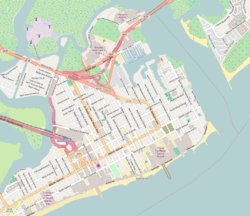Top Qs
Timeline
Chat
Perspective
Clicquot Club
From Wikipedia, the free encyclopedia
Remove ads
Clicquot Club was a nightclub at 15 North Illinois Avenue[a] in Atlantic City, New Jersey, in the heart of the city. Billed as the club that "never closed",[2] it became notorious as an illegal gambling spot in the city.[3]
Remove ads
History
Summarize
Perspective
Operating during the Prohibition era in the 1920s, the club provided both illegal liquor and illegal gambling.[3] The bar and cabaret were considered "feeder rooms" to bring people to the profit-making roulette wheels, craps tables, and card games in the backrooms.[4] A news item in December 1931 reported a raid on the club in which Federal agents removed $20,000 worth of lavish Japanese and Chinese furnishings from the 20-room mansion and "poured several thousand dollars worth of alleged whiskies and champagnes down a drain".[5]
The bar and cabaret also developed a reputation for lawlessness, as the Clicquot became known as one of the "bust-out joints" for Philadelphia convention-goers eager to "release their inhibitions as they experienced everything and anything available".[6][7] Until 1951, when the Kefauver Committee mounted an "anti-hostess campaign", the Clicquot used its waitresses to push drinks on guests and even offer to sit and drink with them, in violation of New Jersey's alcoholic beverage control laws.[8]
The cabaret underwent a series of management changes in the 1940s. In March 1942 Max Cohen assumed management of the cabaret.[9] In February 1943 Cleo Valenteene, a former burlesque and nightclub dancer, became manager,[10] followed by performer Nan DeMar in July 1943.[11] In December 1950 Michael J. Keeley became the owner-operator.[12][13]
Remove ads
Shows
The Clicquot Club has been called "the leading white nightclub" in Atlantic City.[14][15] In 1945 popular black bandleader Mandy Ross was booked into an engagement at the club, and a white vocalist refused to perform with the band.[15] In 1946, Eleanor Sherry and Her Swinghearts performed at the club.[16] The cabaret often booked revues, including the 1946 Nan DeMar revue[17] and a 30-performer revue in 1948.[18] Eddie Kaplan was responsible for booking acts to perform at the club in the late 1940s.[18][19][20] In 1947 drink prices started at 90 cents at the Clicquot Club, Paddock International, and Club Harlem.[21]
Remove ads
Notes
- Illinois Avenue no longer exists. It was renamed Dr. Martin Luther King Boulevard in 1988.[1]
References
Sources
Wikiwand - on
Seamless Wikipedia browsing. On steroids.
Remove ads


